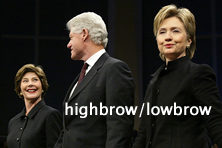Did you hear? Presidential candidate John Edwards got two $400 haircuts in Beverly Hills. His campaign paid for the haircuts. Edwards announced he was reimbursing the campaign for the amount, which should not have been paid out of campaign funds. Reporter Adam Nagourney of the New York Times (or, perhaps, the word hack is more applicable) writes a news-less piece today (hey, he's good at it!) about this haircut scandal, getting an excuse to use words like "coiffure" and "stylist." Nagourney also got to use his trademark lazy-kitty purr, writing:
John Edwards, the North Carolina Democrat, announced on Thursday that he was reimbursing his campaign $800 to cover what his aides said was the cost of two haircuts — yes, you read that correctly — by a Beverly Hills barber, though, perhaps, the word stylist is more applicable. Oh... snap! You go, girl!
Perhaps, indeed!
Well I have one vital and profound question for all of you out there (and for Mr.
Nagourney): have you ever tried to get a decent haircut in the greater
Los Angeles area? Have you?
I have, my friends. I have. And it is not easy, nor is it pretty.
When I moved to
Los Angeles in 2004, my first haircut attempts were in
Silverlake, most likely at a joint named, um, let's call it "Judy's," where the "stylists" had bad attitudes and the conversation was minimal. You could buy over-priced magazines, shirts or even shoes while you waited. You could not help but enjoy the polished concrete and the high ceilings. However, every time I left, my hair always looked, well, violated. But the place was cheap-- around 20 bucks-- and you do get what you pay for, no?
My next ventures were in the Beverly Hills area, at a "salon" a friend chose for me because of a friendship he had with the "stylist" there (long story) and here the trim results were grim. The haircut was, with tip, around $90 and I was so fearful of offending the "stylist" (and by implication, our mutual friend) that I never complained. Here, the conversation was plentiful and the water purified. But the hair cutting was troubling. It seemed you did not get what you paid for (plus parking was a nightmare).
As of late I have been trying out spots in Venice, light and airy places where they offer you a beer or wine and everyone is too cool to be in a hurry. But again, the result up above has been dismal. My bangs never look right, my line in the back is never quite straight, and my sides, well, let's not go there.
The point is this: when you find a good "stylist" in
Los Angeles, pay them
anything they want. I am running on three years in this locale and no haircut can match my former Iowa
stylings (those folks can
cut hair). And heck, I am not even running for President, nor am I
monied like John, but I tell you, no price is too high. While pundits can question whether Edwards is a true man of the people because his hair is too perfect, I am left to sigh at one more thing John Edwards and I have in common--we'd both give anything for a good haircut.
Update: Check out a
very un-clever missive from Maureen Dowd on the subject (oh, she uses the term "blowout"!
Dowd is as clever as
Nagourney!). If people truly believe this haircut incident is reflective of something about Edwards' character, then by all means vote for someone else. The state of our political discourse has become so lame and tired that well-kept journalists, made-up with expensive hairdos and outfits, feel the freedom to raise up some false outrage and find this sideline activity offensive (check out
Dowd's photo next to the article--um, speaking of blowouts...). Forget any facts or issues, and definitely forget any sense of humor--this proves Edwards is a faggot, right? Isn't that what all of these stories really want to say? Democrats are fags? From nappy-headed to too well-coiffed. What a hairy month in America.
The entire storyline is a distraction from any progress on any significant issue. Wake up. I want to see Hillary's salon bill, pronto. Or Mitt Romney's. Actually, no I don't--I don't care about their hair. I care about their vision and their voice. Silly me.
 Over the weekend in San Francisco, Elizabeth Edwards revealed that she is "comfortable" with gay marriage. The San Francisco Chronicle reported this position was "markedly" different than her husband's position, which is in support of civil unions, but not marriage. Question: how does such a distinction qualify as "marked"? (Which means "strikingly noticeable".)
Over the weekend in San Francisco, Elizabeth Edwards revealed that she is "comfortable" with gay marriage. The San Francisco Chronicle reported this position was "markedly" different than her husband's position, which is in support of civil unions, but not marriage. Question: how does such a distinction qualify as "marked"? (Which means "strikingly noticeable".)








 How much can a poor nation take?
How much can a poor nation take? 
 Ron Paul doesn't dare to play by the Culture of Countermand rules, and man it irritates Bush-mold Republicans.
Ron Paul doesn't dare to play by the Culture of Countermand rules, and man it irritates Bush-mold Republicans.












